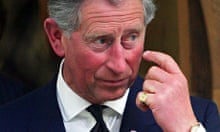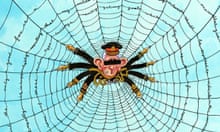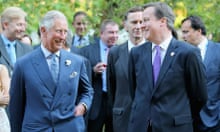The attorney general Dominic Grieve's bid to hide Prince Charles's ministerial lobbying from public eyes was rebuffed in the court of appeal when three judges agreed that he had no good reason in law or fact to veto the publication of the so-called "black spider memos". This is an important but not yet a final victory in a long-running Guardian campaign to uncover the Prince's apparent attempts to influence government. It is a fight that raises important questions about constraints on the freedom of information, the relationship between politicians and the law, and the proper limits to the monarchy.
The letters, all 27 of them, were written to seven different government departments between September 2004 and April 2005, in Prince Charles's trademark black ink. They were letters of advocacy so blunt that Mr Grieve has argued they have to be repressed in order to avoid compromising the public perception of the prince's political neutrality. In October 2012, the information tribunal declared that the letters should be published. Mr Grieve, rather than launching an appeal against the tribunal and arguing through the case, simply vetoed its conclusion on the grounds that he disagreed with it. He supported his decision with reasons that had already been considered and rejected by the tribunal in a six-day hearing resulting in a long and, in the words of the master of the rolls, Lord Dyson, "meticulous" judgment. Yesterday Lord Dyson ruled that a politician cannot overrule the findings of a court by what amounts to ministerial fiat.
If upheld in the supreme court, that will mean ministers will find they cannot use the veto unless they can produce new evidence or information that was not available to the tribunal. That is an important improvement, but the veto itself remains in force, despite being, in the words of one senior judge, a constitutional aberration. Meanwhile, an appeal is pending in a separate case, where the transport secretary vetoed the release of the project assessment report on HS2. In a significant development for green campaigners, the appeal court decision means that the veto cannot be used at all for information requested under EU environmental regulations.
And still the fundamental question remains: how far was Prince Charles trying to influence government policy, and how effective was his lobbying? There was no doubt that Whitehall put his communications at the top of the pile. Mr Grieve described them as "particularly frank". It is clear that it is in the public interest to know whether, and how far, the concerns of Clarence House influenced public policy. It is harder to see that it is in the public interest to continue to use secrecy to protect the prince, substituting speculation and innuendo for truth and transparency.






